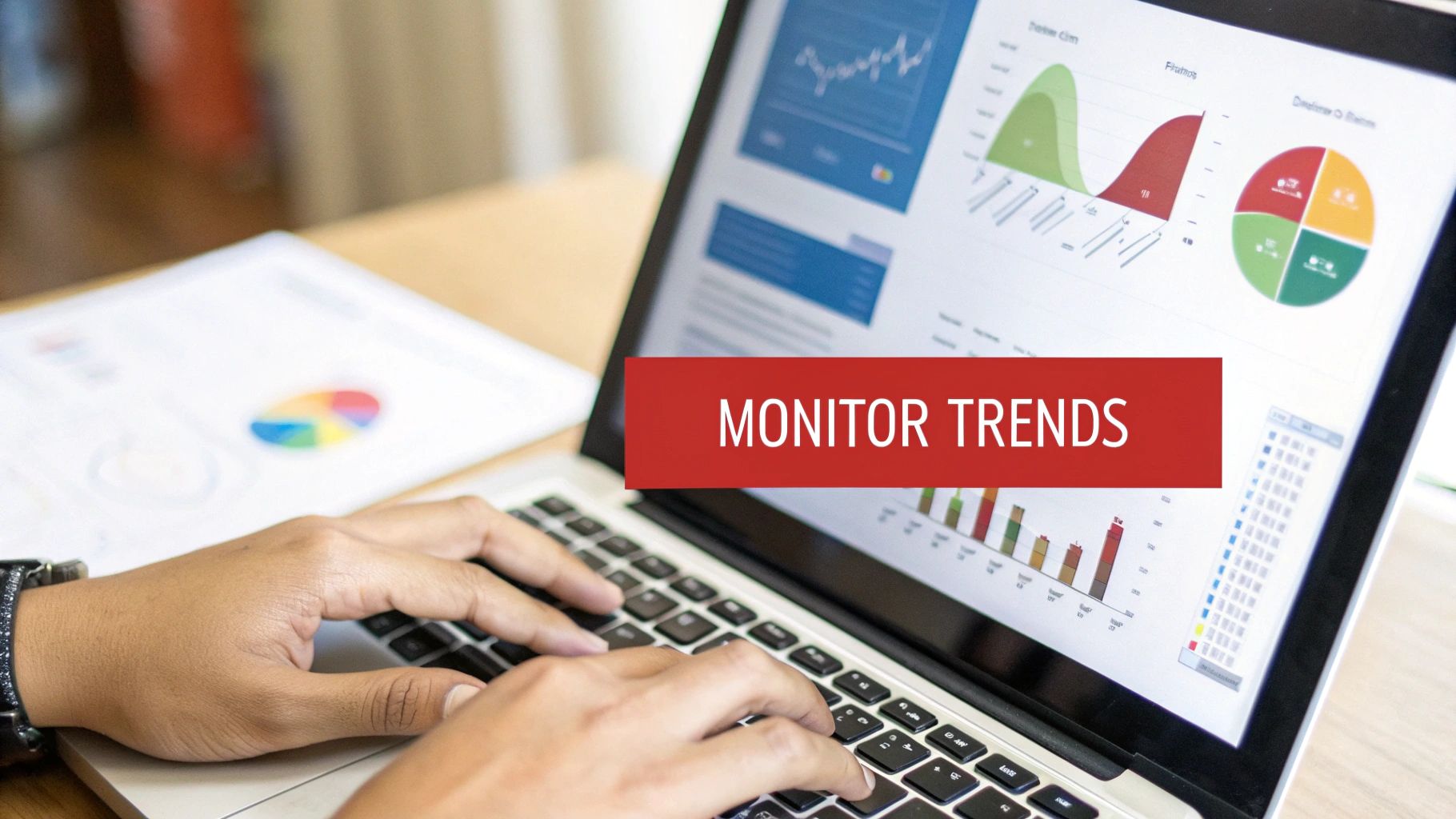Online Reputation Management Tools
Discover the most effective online reputation management tools that transform your brand's digital presence. Learn expert strategies for monitoring, analyzing, and enhancing your online reputation with actionable insights.
- 9 min read

Smart Ways to Manage Your Business Reviews Online
Your business's online reputation directly influences sales and customer trust. While one negative comment can quickly spread online and affect potential customers, having the right tools to manage your reputation makes a big difference. Online reputation management (ORM) tools help businesses track, analyze and guide their digital presence in meaningful ways.
Core Benefits of Review Management Tools
Modern ORM tools give businesses better control over their online image. The sentiment analysis features help you understand how customers feel about your brand and products in real-time. You can spot potential issues early by monitoring conversations about your business across different platforms, allowing you to address concerns quickly before they grow into bigger problems.
These tools also provide clear reporting and analytics to show you exactly how customers view your business. The data helps identify what you're doing well and where you need to improve. Plus, the automation features handle routine tasks like review monitoring and responses, saving your team valuable time they can spend on other priorities.
Growing Demand for Review Management Software
More businesses are investing in tools to manage their online reputation, driving rapid growth in the ORM software market. Current research shows the market value reached $5.2 billion in 2024 and is expected to grow to $14.02 billion by 2031, increasing at 13.2% annually. These tools help businesses track online discussions about their brand as they happen and understand customer sentiment. This allows companies to spot potential reputation risks early and take action to address them. For more details on market growth, check out this comprehensive market research report.
Must-Have Features in Review Management Tools
The best ORM platforms include several essential capabilities that set them apart. Real-time monitoring keeps you informed about new mentions and customer feedback across different sites. Automated reporting makes it simple to analyze data and spot reputation trends. Sentiment analysis uses AI to detect the emotional tone in customer conversations, giving you deeper insight into how people feel about your brand. Integrated response management lets you reply to customer feedback directly through the platform, making it easier to maintain good customer relationships. When combined, these features help businesses build and protect a strong online reputation.
Why Leading Brands Are Investing Heavily in ORM Solutions

A company's online reputation has become essential for business success. Customer reviews, social media comments, and online mentions directly impact how people perceive and interact with brands. That's why major companies are putting significant resources into online reputation management (ORM) solutions - tools that help them build trust, address feedback, and grow their customer base.
The Tangible Benefits of ORM Tools
Good ORM tools give businesses clear visibility into what customers are saying online. For instance, when someone posts a negative review, the company can quickly spot it and respond thoughtfully before it becomes a bigger issue. The tools also analyze customer sentiment patterns over time, showing what aspects of the business customers love or feel need work. This helps companies make smart improvements based on real feedback rather than guesswork.
The Financial Impact of a Strong Online Reputation
The numbers show just how much online reputation affects the bottom line. Research indicates that positive reviews and ratings directly boost sales and customer loyalty. On the flip side, negative reviews can quickly drive customers away. The ORM software market reflects this reality - valued at $175 million in 2022, it's expected to reach $585 million by 2030, growing 16.28% annually. Large companies are leading this trend, recognizing that managing their online image is crucial for growth. You can find more market data here.
Building a Proactive Reputation Management Strategy
Smart companies don't wait for reputation problems to pop up - they actively manage their online presence. This means regularly checking what customers are saying, responding quickly to feedback, and building stronger relationships over time. ORM tools make this easier by organizing customer comments and streamlining responses. Want to learn more about handling customer feedback? Check out this guide on How to master customer reviews. The key is showing customers you care about their experience while protecting and strengthening your brand's reputation.
Essential Features That Define Top-Tier ORM Platforms

A strong online reputation can make or break a brand's success. To effectively manage their digital presence, companies need robust online reputation management (ORM) tools with specific core capabilities. Let's explore the key features that set apart the best ORM platforms from basic solutions.
Real-Time Monitoring and Alerts: The Pulse of Your Reputation
The best ORM tools act like a constant digital watchdog for your brand. They scan social media, review sites, news outlets, and forums 24/7 to catch any mention of your company name. When someone posts about your brand - whether positive or negative - you'll know right away through instant alerts. This quick awareness lets you address problems before they grow and engage with positive feedback while it's fresh.
Sentiment Analysis: Deciphering the Emotional Landscape
Understanding how people feel about your brand is just as important as knowing what they're saying. Modern ORM platforms use AI-powered analysis to sort mentions into positive, negative, or neutral categories. This helps you spot patterns - like whether customers consistently complain about shipping delays or praise your customer service. With these insights, you can focus your efforts on fixing real problems that affect your reputation.
Comprehensive Reporting and Analytics: Data-Driven Insights
Good decisions come from good data. Quality ORM platforms provide detailed reports showing your reputation trends over time. You can track metrics like overall sentiment, mention volume, and campaign performance. Many tools also let you measure your brand against competitors. These numbers help prove what's working and show where you need to improve your reputation strategy.
Response Management and Engagement: Building Bridges With Your Audience
The best ORM tools make it simple to respond to customers across all channels. Instead of logging into multiple platforms, you can reply to reviews, comments and mentions from one central dashboard. Many tools offer response templates for common situations to help your team reply quickly and consistently. Quick, thoughtful responses show customers you care about their feedback and help build lasting relationships.
Review Management and Generation: Cultivating Positive Feedback
Getting and managing customer reviews is crucial for a strong online reputation. Top ORM platforms include features to automatically ask happy customers for reviews and make it easy for them to share their experiences. They also help you track and respond to reviews across different sites. This systematic approach helps you build up positive reviews while staying on top of customer feedback.
Maximizing Your Return on Reputation Management Investment

Getting value from online reputation management (ORM) tools requires smart decision-making about where to invest your budget. While these tools can boost your business results, it's important to choose ones that match your specific needs and goals. Let's look at practical ways to get the most from your ORM investment.
Understanding the Costs and Benefits
The cost of ORM tools varies based on what features you need and how big your business is. Basic monitoring packages start at lower price points, while premium options with advanced features like detailed analytics and reporting cost more. Before buying any tool, carefully evaluate what capabilities your business actually needs. You might be interested in: 10 reasons reviews can grow your business.
Recent market data shows growing investment in this area. Small and mid-sized US businesses spent $1.3 billion on ORM tools in 2011, increasing to $1.6 billion in subsequent years. This shows more companies recognize the value of managing their online presence. You can find more industry statistics here.
Choosing the Right Tools for Your Needs
Each ORM tool has different strengths. Some excel at monitoring reviews, while others focus on social media tracking or broader web presence management. For example, kisReviews helps businesses collect and showcase customer reviews directly on their websites. Pick tools that directly support your main business objectives.
Key Features to Look For
Several core features provide clear business value. Real-time alerts help you spot and address negative feedback quickly. Sentiment analysis shows you how customers really feel about your business. Reporting tools let you track progress and prove ROI over time. Look for these essentials when comparing platforms.
Measuring Your ORM ROI
Track specific metrics to measure your return on investment. Focus on numbers that directly impact your business: more positive reviews, higher star ratings, increased website visits, and better sales conversion rates. Compare these metrics before and after implementing your ORM strategy to see real results.
Scaling Your ORM Strategy
Your reputation management needs will grow with your business. Choose tools that can grow with you without requiring a complete overhaul of your system. Good platforms let you add features, monitor more channels, or analyze more data as needed.
Building Your ORM Success Blueprint
Getting real results from online reputation management (ORM) tools takes more than just installing software. You need a practical plan to make it work. Here's how successful businesses have built systems that actually get results when managing their online presence.
Laying the Foundation: Tool Integration and Team Training
The first priority is connecting your ORM tool with all your key online accounts - social media, review sites, and anywhere else customers talk about you. Think of it as creating a central hub that lets you monitor and respond to everything in one place. Just as important is making sure your team knows how to use it. Everyone who interacts with customers needs solid training on the basics like finding mentions and posts, as well as advanced features for analyzing customer sentiment and crafting responses.
Establishing Effective Monitoring Routines
With your tool set up and team trained, create clear schedules for checking and responding to online activity. While real-time alerts are crucial, you also need regular deep-dive analysis. Set aside time each week to look for patterns in feedback, spot recurring issues, and see if your responses are working. Being proactive helps catch small problems before they grow into bigger ones.
Creating Response Protocols That Protect Your Brand
Your team needs clear guidelines for handling both praise and criticism online. A simple thank you works great for positive reviews and helps build loyalty. But negative feedback requires extra care - train your team to respond quickly with empathy and professionalism. This shows you take feedback seriously and want to make things right. Check out our guide on the best way to get online reviews with email for more tips.
From Immediate Action to Long-Term Success
Managing your online reputation is an ongoing process, not a one-time fix. While you need to handle day-to-day issues promptly, focus on building practices that last. This means regularly asking for feedback, making it easy for happy customers to leave reviews, and staying on top of what's being said about you online. The right combination of tools and clear processes helps create a strong online presence that builds trust and brings in business. Remember - your reputation online needs constant attention to stay healthy and grow.
The Future of Reputation Management Technology

Online reputation management (ORM) tools and techniques continue to evolve at a rapid pace. As companies work to maintain their digital presence, new technologies are creating better ways to monitor, analyze and improve online reputations. Understanding these emerging capabilities helps businesses stay ahead in managing their online image.
The Rise of Artificial Intelligence
Artificial intelligence (AI) is fundamentally changing how businesses handle reputation management. AI tools can process and analyze massive datasets in minutes - work that would take humans weeks or months to complete. This speed and scale allows companies to spot meaningful patterns in customer feedback and identify potential issues early. For example, AI analysis can detect subtle shifts in sentiment across social media conversations, providing deeper insights than basic positive/negative classifications.
Predictive Analytics: Anticipating Future Trends
Building on AI capabilities, predictive analytics helps businesses get ahead of reputation challenges rather than just reacting to them. These tools analyze historical data patterns to forecast potential future issues. For instance, if customer complaints about a new product feature start trending upward, predictive systems can alert teams before the problem significantly impacts the brand's reputation. This early warning system gives businesses valuable time to address concerns proactively.
Advanced Sentiment Analysis: Beyond Positive and Negative
Traditional sentiment analysis tools simply categorize feedback as good or bad. Modern systems now detect complex emotional nuances like confusion, delight, or irony in customer comments. This deeper understanding helps companies craft more appropriate and effective responses. When businesses truly grasp the emotions behind customer feedback, they can address concerns more meaningfully.
Integration and Automation: Streamlining ORM Processes
ORM tools are becoming more connected with other business systems, creating smoother workflows. Instead of jumping between different platforms, teams can manage reputation tasks directly within their regular business tools. Basic tasks like monitoring reviews and sending initial responses can now be automated, giving staff more time to focus on complex customer interactions and strategy development.
The Importance of Human Oversight
While technology handles many ORM tasks, human judgment remains crucial. These new tools work best as aids to human decision-making, not replacements for it. Businesses still need skilled professionals to interpret data insights, develop response strategies, and maintain authentic customer relationships. Success comes from combining technology's analytical power with human emotional intelligence and strategic thinking.
Ready to take control of your online reputation? kisReviews provides the tools you need to collect, manage, and showcase customer reviews, building a stronger online presence for your business.
